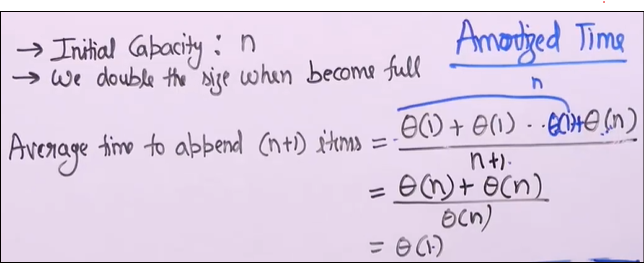Lists
Study resources for Data Structures & Algorithms
Geeks for Geeks
List
-
Popular functions
- Append()
- Insert(loc, var)
- var in list
- count(var)
- index(var)–error if abscent index(var, start, end)
- remove(var)
- pop() –returns, index optional
- del list[index start : end]
- max, min, sum,list.reverse(), sort() –for strings only sum will not work
- map: ```python # input size of the list n = int(input(“Enter the size of list : “)) # store integrs in a list using map, # split and strip functions lst = list(map(int, input(“Enter the integer
elements:”).strip().split()))[:n]
# printing the list print(‘The list is:’, lst)
```
- Clear() Removes all items from the list
- copy() Returns a copy of the list
-
Working:
- Use array Data Structure (Array of references which are continous) . Actual items are not continous Dynamic insertion. Allocate extra memory
- Preallocate some space. If becomes full
- Allocate new space (multiply by x=1.125)
- Copy old space to new
- Free old space

-
Advantages:
- Random Access (ith item in constant time, address computations done to find location of ith item)
- Cache friendly
- Dynamic size
- Flexible types
-
DisAdvantages:
- Insertion, Deletion and search are slow.Take linear time
-
Other functions
- reduce() apply a particular function passed in its argument to all of the list elements stores the intermediate result and only returns the final summation value
- sum() Sums up the numbers in the list
- ord() Returns an integer representing the Unicode code point of the given Unicode character
- cmp() This function returns 1 if the first list is “greater” than the second list
- max() return maximum element of a given list
- min() return minimum element of a given list
- all() Returns true if all element is true or if the list is empty
- any() return true if any element of the list is true. if the list is empty, return false
- len() Returns length of the list or size of the list
- enumerate() Returns enumerate object of the list
- accumulate() apply a particular function passed in its argument to all of the list elements returns a list containing the intermediate results
- filter() tests if each element of a list is true or not
- map() returns a list of the results after applying the given function to each item of a given iterable
- lambda() This function can have any number of arguments but only one expression, which is evaluated and returned.
-
Slicing
- Negative steps to reverse list
- gives different for list only. tuple gives same back…since immutable
-
Comprehensions
Sets
do not contain duplicates. {}
-
Sets
Dictionary
do not contain duplicates. {}
-
Comprehensions
- list(li) to set, dictionay d1 = {x:x**3 for x in l1} d1 = {x:f”ID{x}” for x in l1} d1 = {l2[i]:l3[i] for i in range(len(l2))} or **## d3 = dict(zip(l2,l3)) **
- reverse dictionary d2 = {v:k for (k,v) in d1.items()}
## A New Post for resources to learn Data Structures & Algorithms
- website
- videos
- Practise and competitive matches
- Pdfs